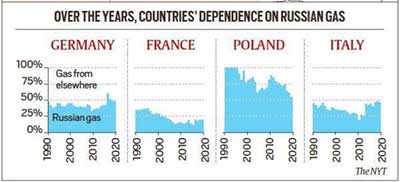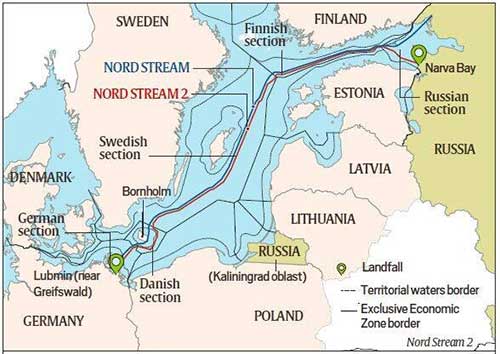Relevance: GS-2:Bilateral, regional and global groupings and agreements involving India and/or affecting India’s interests.
Key Phrases: Nord Stream 2, Ukraine Crisis, Geopolitics around Nord Stream 2, US and EU and Gas, Germany’s Intervention, Erope concerns over Nord Stream 2, Ukraine Concerns Over Nord Stream 2
Why in News?
- Recently, Russia has announced withdrawal of some troops from the Ukraine border, but US concerns remain around the Russia-to-Germany Nord Stream 2 gas pipeline.
- Nord Stream 2 gas pipeline is perceived by some as a geopolitical weapon.
About Nord Stream 2
- Nord Stream 2 is a 1,200-kilometer pipeline under the Baltic Sea which will take gas from the Russian coast near St Petersburg to Lubmin in Germany.
- It cost €10bn (£8.4bn) to build and was completed September 2021.
- The Russian state-owned energy giant Gazprom put up half of the cost and western energy firms such as Shell and ENGIE of France are paying the rest.
- Although it is awaiting German certification to become operational.
- Nord Stream 2 runs parallel to an existing gas pipeline, Nord Stream, which has been working since 2011.
- Together, these two pipelines could deliver 110bn cubic meters of gas to Europe every year. That is about two-thirds of all the gas that European Union countries use annually.

Supporter of the Project
- Clearly, Russia and Germany both support the project.
- But in Berlin, especially against the backdrop of the newly formed government consisting of three different parties, there have repeatedly been different views on whether and when Nord Stream 2 should be launched.
- The Greens, for example, reject the project for geostrategic and climate policy reasons.
- The liberal FDP sees a need for action.
- In principle, Germany relies on Russian gas, considered to be a transition fuel in the green transition.
- The pipeline would be a relatively cheap way to obtain the raw material and cover the country's energy needs.
- Moscow would benefit from this, as it could sell its gas, which would bring financial returns.
- About 55 billion cubic meters of gas are to be delivered from Russia to Germany through the Baltic Sea every year.
- According to the operating company, this could supply 26 million households.
Europe Concerns
- Ukraine is angry with the pipeline because it bypasses the country and thus denies transit fees for Russia’s gas exports.
- The project could reduce the status of the pipelines that already exist on the land route, and important revenues generated by transit fees could thus be lost.
- It has also raised fears that Russia could cut off gas supplies to Ukraine without endangering its own gas exports to Europe.
- It could give Russia complete dominance over gas supplies to Europe, and leverage and influence over these countries.
- It has also awakened old fears in some countries about Russia and Germany coming together against the rest of Europe.
- Some European Union members have security concerns about Russian presence in their waters, required to guard the 1,222-km pipeline that goes under the Baltic Sea past Finland, Sweden, and Poland before entering Germany.
America’s Concerns
- The United States believes the pipeline could give Russia too much leverage and influence over Europe.
- It increases the threat of a Russian invasion of Ukraine, and hinders its own efforts to contain Russian leader Vladimir Putin.
- The US has been opposed to the project from the start, but
Germany under then Chancellor Angela Merkel pushed ahead with it.
- Despite the strain in Moscow-Berlin ties over the Alexei Navalny affair - Merkel blamed the Kremlin for the attack on the Russian opposition leader.
- Even before the current crisis over Ukraine, the US had imposed some
sanctions against the pipeline project.,
- Although in May 2021, the Biden Administration waived two crucial sanctions that would have torpedoed it entirely, in a bid to give diplomacy a chance.
- In July 2021, President Joe Biden and Merkel sat down to talk, agreeing in broad terms that Russia would not be allowed to use the pipeline as a weapon against Ukraine.
- But Merkel also said the two sides had “come to different assessments as to what this project entails”.
- The two leaders were seen to have prevented a breakdown of the
transatlantic alliance that US sanctions against Germany and other
supporters of the pipeline in Europe - notably France, Austria and the
Netherlands - might have brought about.
- But some also saw it as a surrender by the US.
- Over the last few weeks, Biden and other US officials have been vocal that if Russia invades Ukraine, Nord Stream 2 would be among the first casualties .
- According to some analysts, the US sees the coming together of Russia and Germany in an economic partnership as a precursor to upending its role as the guarantor of security in Europe.
- The US sees the Nord Stream 2 as a threat to an arrangement that has existed from the end of World War II and the start of the Cold War.
German Intervention
- Olaf Scholz (Chancellor of Germany) undertook the US visit in
response to criticism at home and abroad that he had been “missing in
action” during the Ukraine crisis.
- Even French President Emmanuel Macron took the lead with his shuttle diplomacy between Ukraine and Russia.
- Scholz held out the reassurance that Germany was not about to break away from its NATO allies
- But it was noticed that he did not utter the word Nord Stream during his visit.
- Like Macron, Scholz also held talks with Ukrainian President Volodymyr Zelensky and proceeded next to Moscow for talks with Putin.
- Even as they reiterated their different positions and demands, Russia announced on the same day that it had “partially” withdrawn troops from the Ukrainian border.
- It is unclear if Russia’s troop withdrawal had anything to do with Scholz, but it has helped salvage some of his image as a leader of Europe.
US, EU and Gas
- The US’s insistent opposition to Nord Stream 2 over three administrations - Obama, Trump and now Biden – has revived discussion on an old question asked whenever the US enters an arena of conflict – “is it all about the oil”, or in this case, gas?
- The EU imports less than 5% of its gas from the US (the top four suppliers are Russia at 41%, Norway at 16%, Algeria at 7.6% and Qatar at 5.2%, according to 2019 figures).
- But as a net exporter of LNG since the middle of the last decade, the US wants to expand its markets and reach in the continent.
- According to one estimate, 23% of US exports of gas are to the EU now, and in 2021, hit a high of 21 billion cubic meters (bcm).
- Among the buyers are France, Italy, Spain, Greece, Portugal and a host of smaller countries.
- US exports are seen by some as vital to the diversification of Europe’s energy supplies, and its energy security.
- In January, in a war-like atmosphere, Europe imported more gas from the US than from Russia.

Conclusion
- Bypassing Ukraine sharply reduced the country’s leverage with Russia and reduced its income. However, Europe and Germany depend on Russia’s gas, with this current conflict exposing vulnerabilities, meaning Nord Stream 2 has become both a deterrent to war in Ukraine and a punishment option in the event there is one.
Mains Question:
Q. Evaluate the geopolitics surrounding the Nord Stream 2 pipeline. (250 Words)
Source: Indian Express









